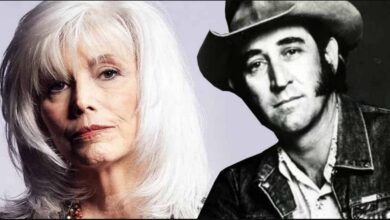This Version Of The Song Is The Best, Performed By One Of The Greatest Country Singers
Ricky Van Shelton’s rendition of “Statue of a Fool” underscores the foundational connection he has with traditional country music, revealing the deep, emotional storytelling often associated with the genre. This song, steeped in feelings of loss and regret, exemplifies the very essence of country music’s ability to convey raw emotion. Born in Danville, Virginia, in 1952, Shelton’s formative years were underscored by the rich tapestry of Southern musical traditions. Growing up surrounded by the sounds of bluegrass, folk, and the honky-tonk music prevalent in this region, Shelton developed a unique sensibility that laid the groundwork for his later artistry.
Upon moving to Nashville in pursuit of his dreams, Shelton became part of a vibrant music scene that was both competitive and inspiring. His signing with Columbia Records marked a significant turning point in his career, and the release of his debut album, “Wild-Eyed Dream,” in 1986 was met with considerable enthusiasm. With hit singles like “Crime of Passion” and “Somebody Lied,” Shelton’s talent was undeniable, and he swiftly made a name for himself within the country music community. His distinct voice and heartfelt delivery captured the attention of both critics and fans, reinforcing the notion that he was destined for success.
“Statue of a Fool,” originally penned by Jan Crutchfield, found its way into Shelton’s repertoire during the recording of his third studio album, “RVS III,” released in 1990. The song’s exploration of themes such as heartbreak and regret resonated deeply with Shelton, who infused it with his own lived experiences and emotional insight. Shelton’s ability to convey profound feelings through his music was a hallmark of his style, showcasing his deep respect for the lyrical narratives that define the genre. His rendition of “Statue of a Fool” stands out not only for its vocal prowess but also for the sincerity he brought to the performance.
As Shelton’s career progressed, he remained anchored in the traditional sounds of country music, even amidst sweeping changes in the industry. His dedication to preserving the genre’s roots set him apart from many of his contemporaries, who often leaned towards the more pop-influenced direction that was gaining popularity. This authenticity resonated with audiences who longed for the storytelling and musicality found in classic country, earning him numerous accolades, including several Country Music Association (CMA) awards that recognized his contributions to the genre.
Apart from his musical achievements, Shelton’s creative impulses extended beyond the realm of music. His foray into writing children’s books showcased his versatility, revealing yet another layer to his storytelling capabilities. This artistic exploration endeared him to a broader audience and highlighted the thoughtful, multifaceted nature of his artistry. Shelton’s engagement with various forms of storytelling showcased his commitment to connecting with people across different mediums, a quality that endeared him to his fan base.
Throughout his life and career, Shelton faced a share of personal struggles, including battles with alcohol that he openly discussed in interviews. These candid admissions not only added depth to his persona but also created a relatable narrative for his fans. Many listeners found solace in his music, recognizing the sincerity that stemmed from his life experiences. By sharing his journey, Shelton created a bond with his audience that transcended mere musical engagement; his songs became a refuge for those who had faced similar trials.
In the mid-2000s, Shelton made a conscious decision to step back from the music industry, prioritizing his family and personal well-being. While this withdrawal might have led some to believe that his career was winding down, it instead underscored the importance of balance and self-care in the lives of artists. Although he no longer performed regularly, the reverberations of his work continued to influence aspiring musicians and remained impactful within the country music landscape.
The legacy of “Statue of a Fool,” like much of Shelton’s work, serves as a lasting reminder of the power of emotional authenticity in music. His interpretation of the song continues to resonate with fans, and the themes it encapsulates maintain their relevance today. In a fast-evolving music industry, the enduring appeal of Shelton’s music offers a testament to the timeless essence of traditional country music and its capacity to evoke deep feelings and reflections.
Ricky Van Shelton’s contributions to country music, particularly through songs like “Statue of a Fool,” are immortalized in the minds of listeners who appreciate genuine storytelling. As a pioneer committed to maintaining the genre’s rich traditions, Shelton’s music assures a continuing appreciation for the emotional depth found in country music for generations to come. Through his artistry, he not only entertained but also inspired, leaving an indelible mark on the fabric of country music history.
&ab_channel=RandleDavidson





